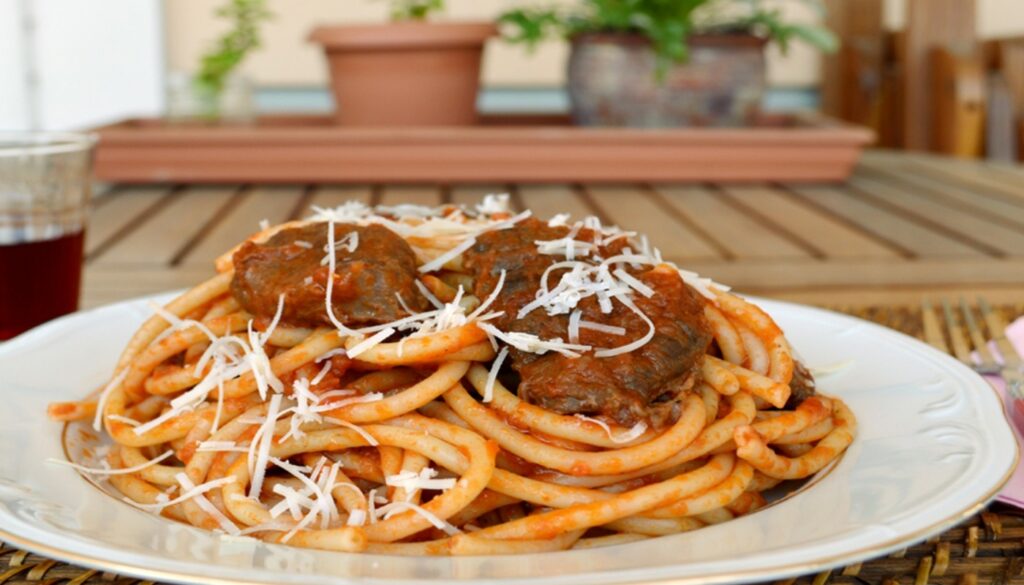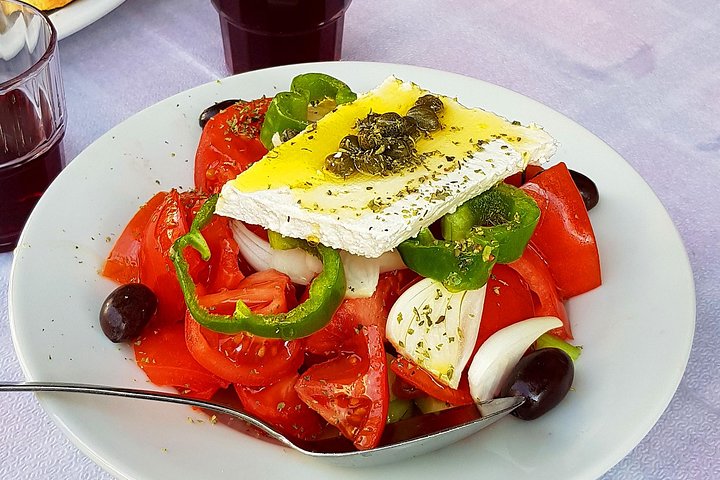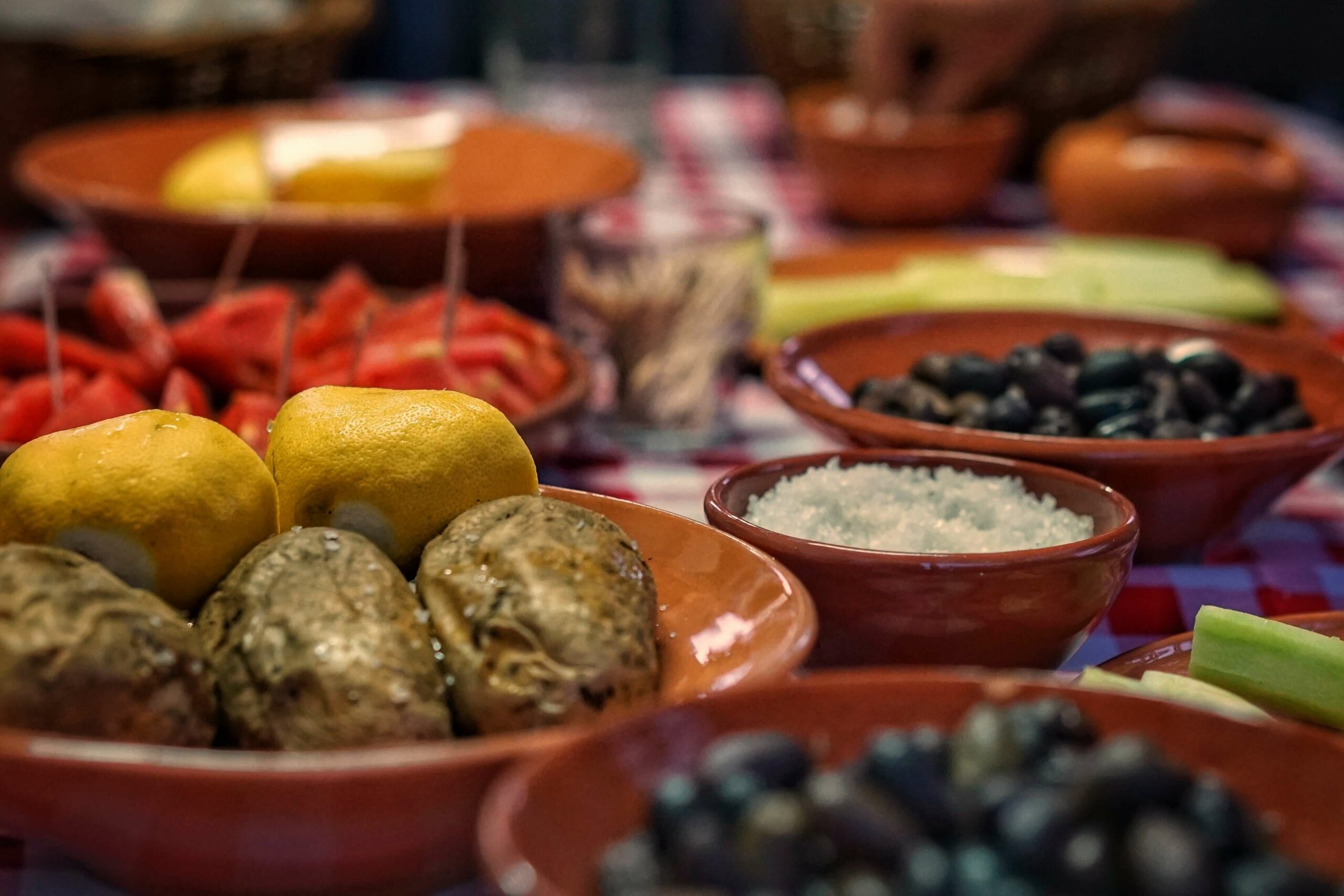START BOOKING YOUR TRIP TO Greece
** Please note that we get a small commission if you book via our referral links. We use this to invest in new foodie content and to update the Greece Foodies website.
Greek Food to Make at Home
Greek food is known for its rich flavors, simple ingredients and local seasonal produce, cooked low and slow. It’s this unique combination that allows the flavors to infuse and the magic to happen.
But even if you don’t have a slow cooker in your backyard or a wood-fired oven at home, you can still easily make some of your favorite Greek foods.

Food in Greece– the basics
Before you get started, for oven based dishes, opt for a clay oven or terracotta pot for the best results, and in some cases a slow-cooker for tenderizing meat.
There’s also a few staple ingredients associated with Greek food you would be wise to stock up on. These include; Greek honey, olive oil, lemons, tomatoes, rose water, ouzo, cinnamon and oregano.
However, the best introduction to Greek cuisine is seeing it made first hand. This way you get a feel for the techniques and ingredients used, many which have been passed on from generation to generation. If you’re visiting Greece, then be sure to embark on a food tour – the best way to get up close and personal.
Finally, if you’re looking for recipe inspiration, there’s some great cookery books from Greek chefs on the market, including Tess Kiros, Theo Michaels and Tonia Buxton, that are worth checking out.
Overview of Greek Cuisine

Greek cuisine is a culinary treasure that has captivated food enthusiasts worldwide. Bursting with fresh vegetables, vibrant herbs, and myriad enticing flavors, Greek dishes celebrate simplicity and tradition. Traditional Greek recipes often highlight ingredients’ natural flavors, allowing the produce’s quality and freshness to shine through.
Fresh vegetables play a central role in Greek cooking, and you’ll find them featured in various dishes. From the juicy tomatoes in Greek salads to the succulent eggplants in moussaka and the tender zucchini in stuffed vegetables, Greek cuisine celebrates the bountiful harvest of the Mediterranean region.
In addition to an abundance of fresh vegetables, Greek dishes are characterized by the use of herbs and spices that add depth and aroma to the food. Herbs such as oregano, mint, dill, and parsley are commonly used in Greek recipes, infusing each dish with a distinct and tantalizing fragrance.
One iconic Greek dish that perfectly represents the essence of Greek cuisine is the classic Greek salad. Made with juicy tomatoes, crisp cucumbers, tangy feta cheese, briny olives, and a drizzle of extra virgin olive oil, this refreshing salad showcases the harmonious combination of fresh ingredients that Greek cuisine is known for.
Benefits of Cooking Greek Food at Home
Cooking Greek food at home offers numerous benefits beyond the sheer joy of preparing and savoring delicious meals. By making Greek recipes in your own kitchen, you have the advantage of selecting high-quality, fresh ingredients. Whether you source them from your local farmers’ market or grow them in your backyard, using fresh vegetables and herbs will elevate the flavors of your Greek dishes to new heights.
Furthermore, cooking Greek food at home allows you to control the ingredients and tailor them to your taste preferences and dietary needs. Whether you prefer to reduce sodium, incorporate more plant-based proteins, or adjust the level of spiciness, you have the freedom to customize each recipe to suit your individual requirements.
Another advantage of making traditional Greek dishes at home is the opportunity to explore and appreciate the rich culinary heritage of Greece. You can immerse yourself in the traditions and techniques passed down through generations, gaining a deeper understanding of Greek culture through its food. The experience of recreating beloved Greek recipes in your own kitchen is not only satisfying but also a wonderful way to connect with the culinary roots of this ancient Mediterranean cuisine.
Now that we’ve laid the foundation for our Greek food adventure, it’s time to roll up our sleeves and dive into some mouthwatering Greek recipes. Join us as we explore the art of creating traditional Greek dishes that will transport you to the sun-kissed shores of Greece.
Must-Try Greek Recipes
Kleftico

There’s nothing quite like kleftico, when it comes to humble Greek food that tastes incredible. This simple dish uses just five ingredients, which is key to its simple and delicious taste; fresh lamb, lemon, potato, oregano and olive oil.
Tess Kiros’ lemon lamb dish is the sort that will have you dreaming about lamb for weeks to come. It requires you to season the lamb (1.5kg), and cover it with the freshly squeezed juice of seven lemons and a healthy pour of olive oil. The key here is to turn the meat in the fridge every hour (except when you’re sleeping) at least 24 hours in advance. The lamb is then cooked on a low heat, alongside thinly cut potatoes, for 6-7 hours.
The result is tender, delicious lamb, with an authentic Greek taste.
Souvlaki
Another Greek food favorite is souvlaki. This street food dish is easy to rustle up at home. Simply mix pork cubes with slices of pepper and cover in oregano and oven cook for up to half an hour. In the meantime, chop some lettuce, red onion and tomato and make (or buy) a Greek dip (Tzatziki). Heat your pitta, and when they’re ready to stuff and serve.
For an extra greek touch, serve with hand-cut chips covered in olive oil and oregano.
Cooking Classes in Greece
Greek Salad
Greek food at its best, a good Greek salad is unbeatable. Serve as a main, or a side, with warm crusty bread or pitta and hummus for all the Greek feels!

Simply cut tomatoes into cube slices (beef tomatoes are good for this) add chunks of cucumber, and Greek Kalamata olives. Invest in a good feta and you’ll notice the difference. Feta shouldn’t be sliced or chopped, but broken by hand for an authentic feel. The whole presentation of a Greek salad should be rustic. Complete with a generous lashing of olive oil, salt, pepper and oregano and you’ll be in food heaven.
💬GreeceFoodies’s reccomendation: Santorini Virtual Cooking class
Keftedes

Keftedes, also known as Greek meatballs, bring a Mediterranean twist on a much-loved favorite.
Made in exactly the same way as normal meatballs, the key difference here is the ingredients. The mince used is a pork-beef mix, which gives it such a juicy flavor. On top of this, red onion, fresh parsley and a touch of mint and oregano are included to deliver the unmistakable taste of Greek. Once fried these can be served with a greek salad, some rice, chips or pitta bread. Unlike the Italian method of mixing these into pasta, they tend to be savored on their own. Once you’ve taken a bite you’ll see why!
💬 Read more: Greek Recipe: Greek Meatballs AKA Soutzoukakia
Tips for a Successful Greek Cooking Experience:
- Embrace the Power of Olive Oil: Olive oil is a staple ingredient in Greek cuisine, adding richness and depth to dishes. When cooking Greek food at home, opt for extra virgin olive oil for its superior flavor and health benefits. Use it generously in dressings, marinades, and sautéing vegetables. Remember to store your olive oil in a cool, dark place to maintain its freshness and quality.
- Experiment with Mediterranean Herbs and Spices: Greek cuisine relies heavily on the aromatic flavors of herbs and spices. To infuse your dishes with that distinct Greek taste, stock up on traditional Mediterranean herbs like oregano, mint, thyme, and rosemary. Sprinkle them over roasted meats, toss them into salads, or incorporate them into marinades and sauces. Don’t be afraid to experiment and find your preferred herb combinations to elevate the flavors of your Greek creations.
- Don’t Forget the Tangy Citrus: Citrus fruits like lemons and oranges are widely used in Greek cooking to add a refreshing acidity to dishes. Squeeze fresh lemon juice over grilled meats, roasted vegetables, and salads to bring a vibrant tanginess to your Greek creations. Additionally, lemon zest can provide a burst of flavor when added to dressings or desserts. Incorporating citrus elements will help brighten up your dishes and add that quintessential Greek touch.
- Get Familiar with Greek Cheese: Greek cuisine boasts a variety of flavorful cheeses that are worth exploring. Feta cheese, with its briny taste and crumbly texture, is a popular choice. Use it in salads, pastries, and as a topping for roasted vegetables. Additionally, graviera, kasseri, and halloumi are other Greek cheeses that can bring unique flavors and textures to your dishes. Experiment with different Greek cheeses to discover new dimensions of taste in your homemade Greek creations.
By incorporating these tips into your Greek cooking adventures, you’ll be well on your way to creating authentic and flavorful Greek dishes in the comfort of your own kitchen. So gather your ingredients, let your taste buds guide you, and embrace the joy of making Greek food at home. Opa!
Armed with a steaming cup of coffee and an infectious love for teamwork, I brew up brilliant product designs and digital marketing strategies that will leave you buzzing with excitement.
















